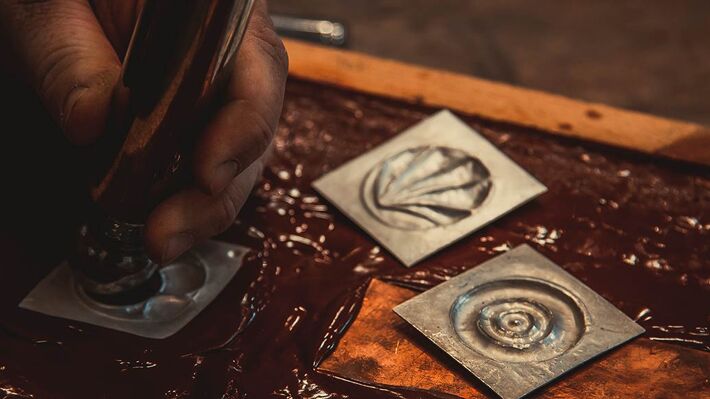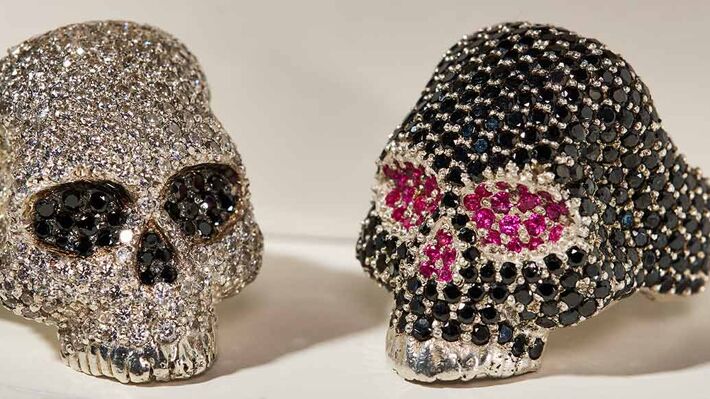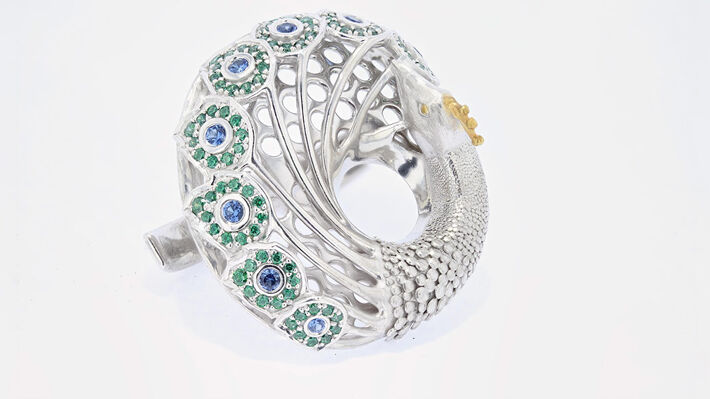Jewellery and Silversmithing - Higher National Diploma
Currently viewing course to start in 2026/27 Entry.
Birmingham City University’s Higher National Diploma course has an excellent reputation within the jewellery industry, with our students and graduates employed at all levels locally and internationally. Being positioned in the Jewellery Quarter in Birmingham, we are uniquely placed to provide the education and skills that we know that employers and industry are looking for....
- Level Undergraduate
- Study mode Full Time
- Award Higher National Diploma
- Start date September 2026
- Fees View course fees
- Subject
- Location School of Jewellery
This course is:
Open to International Students
Overview
Birmingham City University’s Higher National Diploma course has an excellent reputation within the jewellery industry, with our students and graduates employed at all levels locally and internationally. Being positioned in the Jewellery Quarter in Birmingham, we are uniquely placed to provide the education and skills that we know that employers and industry are looking for.
As a Higher National Diploma student, you will be working on live, collaborative and customer-facing projects, broadening your experience through our industry-focussed curriculum. Working at authentic jewellers’ benches, you will develop traditional skills alongside knowledge of contemporary cutting-edge technology.
What's covered in this course?
Our course will immerse you in the world of jewellery and silversmithing as you create pieces in precious and non-precious metals. You will produce pieces by hand and by mechanical means, with a particular focus on manipulating metal.
The practical, design-led nature of the course gives you plenty of opportunity for hands-on workshop experience to hone your skills. You’ll develop practical experience of materials and tools, alongside techniques in drawing and model making to develop your design processes.
You’ll have access to the latest equipment such as laser welders and 2D and 3D CAD software packages, as well as casting and plating workshops.
Dedicated staff with professional experience will offer advice, support and industry contacts. You’ll be encouraged to enter national and international competitions, and you’ll also have fantastic opportunities to work on live projects with industry.
Field trips and study visits add colour and relevance to your studies, and support an understanding of commercial jewellery manufacturing environments.
You’ll study at our internationally-renowned School of Jewellery, in the heart of Birmingham’s famous Jewellery Quarter, where much of today’s jewellery is still made. The historical facade of our Vittoria Street building conceals a contemporary environment, including workshops, a specialist library, a state-of-the-art technology hub, an atrium gallery and an exhibition space.
As a mature student and career changer, it’s been just the best two years! I’ve enjoyed my journey and the areas where I’ve developed and got the most from on the course, are not what I expected them to be when I started. It’s opened my eyes to a whole new world of possibilities.
The teaching staff are fantastic – they all have different styles which means you learn different ways to approach problems and challenge you to push your thinking, creativity, and skills. I’ve found them supportive and encouraging.
Clare Maiden - student
Why Choose Us?
- Founded in 1890, our internationally-renowned School of Jewellery is the largest in Europe, located in the heart of Birmingham’s famous Jewellery Quarter. An estimated 40 per cent of British jewellery is still made here today. Being situated within this wonderful environment you will gain contacts, inspiration and experience.
- The Higher National Diploma course has an excellent reputation for producing highly employable graduates with a practical understanding of the needs of the industry.
- Our well-equipped studio workshops offer a dedicated laser welder, contemporary stone-setting, including optical diamond setting and a dedicated CAD/CAM facility, using the latest relevant CAD packages to enhance the traditional techniques and hand skills you will learn.
- Regular liaisons with the industry in Birmingham’s Jewellery Quarter and beyond offers opportunities to get noticed, make connections and gain employment: we are proud of the number of our graduates who now work at all levels of the trade, locally, nationally and internationally.
- Sponsorship and support from associated companies gives the course industry relevance and insight, supporting the reputation of the Higher National Diploma and endorsing your qualification.
- Top 20 in Art and Design in student satisfaction (Complete University Guide 2024)
Open Days
Join us for our next Open Day where you'll be able to learn about this course in detail, chat to students, explore our campus and tour accommodation. Booking isn't open for the next event yet. Register your interest, and we'll let you know as soon as booking goes live.
Next Open Day: Friday 26 June
Entry Requirements
Essential requirements
64 UCAS Tariff points. Learn more about UCAS Tariff points.
As creativity is an important part of this course, you are expected to submit a portfolio as part of the selection process. This is your opportunity to show your ideas and skills to our tutors.
If you are not studying a creative subject at Level 3, you can still apply for this course. Our portfolio guidance information includes alternative options for how you can show us your passion for art.
If you have a qualification that is not listed, please contact us.
Fees & How to Apply
UK students
Annual and modular tuition fees shown are applicable to the first year of study. The University reserves the right to increase fees for subsequent years of study in line with increases in inflation (capped at 5%) or to reflect changes in Government funding policies or changes agreed by Parliament. View fees for continuing students.
Award: Higher National Diploma
Starting: Sep 2026
- Mode
- Duration
- Fees
- Full Time
- 2 years
- £9,535 in 2026/27 ✱ Important note for this price
- Apply via UCAS
(↩Back to price) * The Government is proposing to apply an inflationary increase to regulated tuition fees for 2026/27 and the University is planning on increasing fees to that maximum level once confirmed.
International students
Annual and modular tuition fees shown are applicable to the first year of study. The University reserves the right to increase fees for subsequent years of study in line with increases in inflation (capped at 5%) or to reflect changes in Government funding policies or changes agreed by Parliament. View fees for continuing students.
Award: Higher National Diploma
Starting: Sep 2026
- Mode
- Duration
- Fees
- Full Time
- 2 years
- £18,970 in 2026/27
Guidance for UK students
UK students applying for most undergraduate degree courses in the UK will need to apply through UCAS.
The Universities and Colleges Admissions Service (UCAS) is a UK organisation responsible for managing applications to university and college.
Applying through UCAS
- Register with UCAS
- Login to UCAS and complete your details
- Select your course and write a personal statement
- Get a reference
- Pay your application fee and submit your application
Portfolio guidance
If you receive an offer to study this course, you will be required to submit a portfolio. We ask that this is submitted within four weeks of receiving your offer.
Please see our portfolio guidance page for tips on putting your portfolio together.
Portfolio guidance
If you receive an offer to study this course, you will be required to submit a portfolio. We ask that this is submitted within four weeks of receiving your offer.
Please see our portfolio guidance page for tips on putting your portfolio together.
Personal statement
The personal statement gives you a crucial opportunity to say why you’re applying and why the institution should accept you.
Here are the three areas you’ll need to address:
- Why do you want to study this course or subject?
Here’s where you explain what makes this course exciting to you. Think about your motivations for studying the course and your future plans. If you’re planning to take a year out, don't forget to give your reasons.
- How have your qualifications and studies helped you to prepare for this course or subject?
This is your chance to show what you’ve learned at school or college. You should include the skills and knowledge you’ve gained from education or training and how this will help you succeed in your chosen course.
- What else have you done to prepare outside of education, and why are these experiences useful?
Not everything you’ve learned comes from the classroom. Life experience counts too! You might want to talk about work experience, employment, or volunteering and how they’ve helped you develop the skills needed for your chosen course or future career.
Worried about Personal Statements?
If you've got no idea where to start or just want to check you're on the right track, we’ve got expert advice and real examples from our students to help you nail your personal statement. You can even download our ultimate personal statement guide for free.

Financial Support
We offer further information on possible undergraduate financial support. This includes the type of loans, grants and scholarships available both from the government and from Birmingham City University.
Course in Depth
Year one
You’ll be given an introduction to the industry and the tools, materials and processes used. The course is based around traditional techniques and projects, with hands-on workshops.
Each project involves a new jewellery or silversmithing technique or process. You’ll work on both large and small scale metalwork and related design processes.
Demonstrations from experts, as well as field trips, will help you understand the techniques and processes and gain networking opportunities.
In order to complete this course a student must successfully complete all the following CORE modules (totalling 100 credits):
In this module you will learn the fundamental hand-skills required for a career in the jewellery industry and you will be based within a real jewellery workshop environment with authentic jewellers’ benches. Throughout the hands-on learning process you will cover the key elements of traditional jewellery techniques, which will give you a basic skill-set to develop as you progress through the course.
In this module, you will learn fundamental hand and machine skills used for the production of larger objects, commonly referred to as silversmithing and small-works. You will experience using specific machinery and equipment located in the basement machine shop, in addition to the tools available in the HND studios and process rooms.
In this module you will be introduced to the techniques used for batch and quantity production in metal.
In order to complete this course a student must successfully complete at least 20 credits from the following list of OPTIONAL modules:
In this module you will be introduced to fundamental hand-making skills through the production of samples, test pieces and a finished piece of jewellery. You will develop an understanding of traditional jewellery techniques and finishes that represent the term fine jewellery.
The science of gemmology is inextricably linked with jewellery, and an understanding of gemstones is essential for anyone involved in the manufacturing, repairing, buying or selling of fine jewellery. Today’s professional gemmologists face constant challenges as advances in synthetic gemstones and gemstone treatments become ever more sophisticated.
In this module, you will learn how to use Computer Aided Design (CAD) as a tool for supporting and supplementing traditional bench skills. This module will introduce you to the very basics, quickly building up your skills and allowing you to design and develop sophisticated 3D digital models which are suitable for production through the myriad of new technologies becoming increasing available in Computer Aided Manufacture.
In this module you will be introduced to the fundamental techniques and processes used in metalwork for creating non-wearable objects through demonstrations and practice.
Core modules are guaranteed to run. Optional modules will vary from year to year and the published list is indicative only.
Year two
You’ll develop your skills in CAD work and build up your professional portfolio. This year also develops your advanced jewellery skills relating to traditional diamond mounting and diamond grading.
A live project forms a compulsory part of your studies this year. Birmingham-based precious metal casting and rapid-prototyping company, Weston Beamor submit a brief to create jewellery and give you the chance to gain recognition, prizes and valuable work experience.
Awards are presented at a prestigious trade fair in Birmingham providing great publicity and networking opportunities.
In order to complete this course a student must successfully complete all the following CORE modules (totalling 120 credits):
In this module you will develop a more in-depth understanding of manufacturing techniques, which will include laser technology and advanced CAD. There will be a greater focus on the commercial applications of lost-wax casting as a means of multiple batch production.
You will also learn about using the laser-welder as a means for the rapid repair and modification of castings, as well as for other industry process requirements. Laser technology opens up unique creative possibilities within the design process and this module provides you with the opportunity to combine production processes, in order to create a collection for sale in a real-world commercial environment.
The purpose of this module is to provide you with an overview of the industry context, in order to prepare you for employment post-graduation. It will ensure that you have an awareness of the complex nature of the jewellery industry and you will be encouraged to begin to develop networks of contacts in order to raise your profile as you identify a career path and launch your career as an industry graduate. It will also assist you to develop the transferable skills that will ensure you can function successfully within this professional context.
This module gives you the opportunity to develop your own unique product range where you will identify your chosen direction and target market within the specialist field. This is a culmination of your learning experience by bringing together all of the knowledge and expertise you have gained on the course. Your ambitions will be clarified through a personal written project brief with the purpose of creating a collection suitable for progression to the BA (Hons) Design for Industry (top-up) course or to launch your career. The ultimate aim is to design and manufacture a market ready product range realised to a high professional standard.
This module provides an opportunity for you to apply your knowledge and skills to an external, professional brief. The brief will be set by an external client/ agency, in consultation with your supervisor, and it could be a ‘real life’ problem to be solved, or a simulation. It is an opportunity for you to engage in a professional manner with an aspect of your subject area, which contributes to the development of employability skills within the supportive infrastructure of the University. Where appropriate, the project may involve interdisciplinary collaboration with students from other courses. In this way, it reflects the collaborative, flexible nature of employment within the Creative Industries.
Download course specification
Download nowThis practice-based course will introduce you to techniques and processes associated with the traditions of the jewellery industry, enabling you to construct pieces in both precious and non-precious metals.
The knowledge and skills of jewellery-making are developed through ‘hands-on’ experience in the workshop and you will benefit from demonstrations given by experienced practitioners in the field. These practical experiences help you to decide on your preferred scale of working, whether that is jewellery or silversmithing.
Our uniquely well-equipped studio workshops offer a range of equipment from traditional Victorian fly-presses to cutting-edge laser-welding and advanced CAD CAM technologies, enabling you to not only learn about the traditional techniques of the bench jeweller but to enhance those skills with the most contemporary processes, through projects which incorporate new jewellery technology.
The course is assessed via coursework, and you will undertake practical and written modules. Alongside workshop practice and demonstrations you’ll learn through a mix of lectures, seminars, critiques, team work, presentations, tutorials, online learning, and self-directed study.
A design focus encourages you to be creative within structured projects. Each project involves a new technique or process, and Ideas are developed and problems solved through drawing, model making and practical experience of materials, tools and techniques.
The practical focus of the course is balanced with personal research to develop intellectual thinking.
Classroom activities and projects
We are proud that the Higher National Diploma course is highly practical and workshop-based. As a student on the course, you will be in the workshop for the majority of your time and will be learning by actually making real jewellery and silverwares in a real jewellery workshop. Within a few days of starting, you will have created your first piece of jewellery!
The course is designed to give you the chance to work with industry and in your ‘Live Project’ module, you will get the chance to design work in collaboration with a commercial jewellery house, making pieces which will be showcased as part of their presentation at the International Spring Fair in Birmingham. Previous students who have taken part in this project have sold their work through the company and have been employed to create further collections.
We want the workshop to feel as similar to the real-world as possible and you will be invited throughout to engage with the relaxed but focused environment which we try to create. As part of the course, we have informal chats about all aspects of the industry and we welcome your thoughts and feedback at all times about your work and the work of your colleagues, which includes the staff.
As part of creating this nurturing environment, we have occasional informal lunches, evening events and visits from a wide range of people, including stone-dealers, famous jewellers and booksellers. The workshops are open for you to use from 8am in the morning to 8pm at night and you will have the opportunity to make your own work.
The course is taught through a wide range of methods but mainly by demonstration and by hands-on experience. The staff have enormous experience of all aspects of making and where specific expertise is needed, we bring in Visiting Tutors.
Discover the community in the College of Jewellery, Fashion and Textiles where our students talk about their journeys here at BCU which has inspired creativity and innovation.
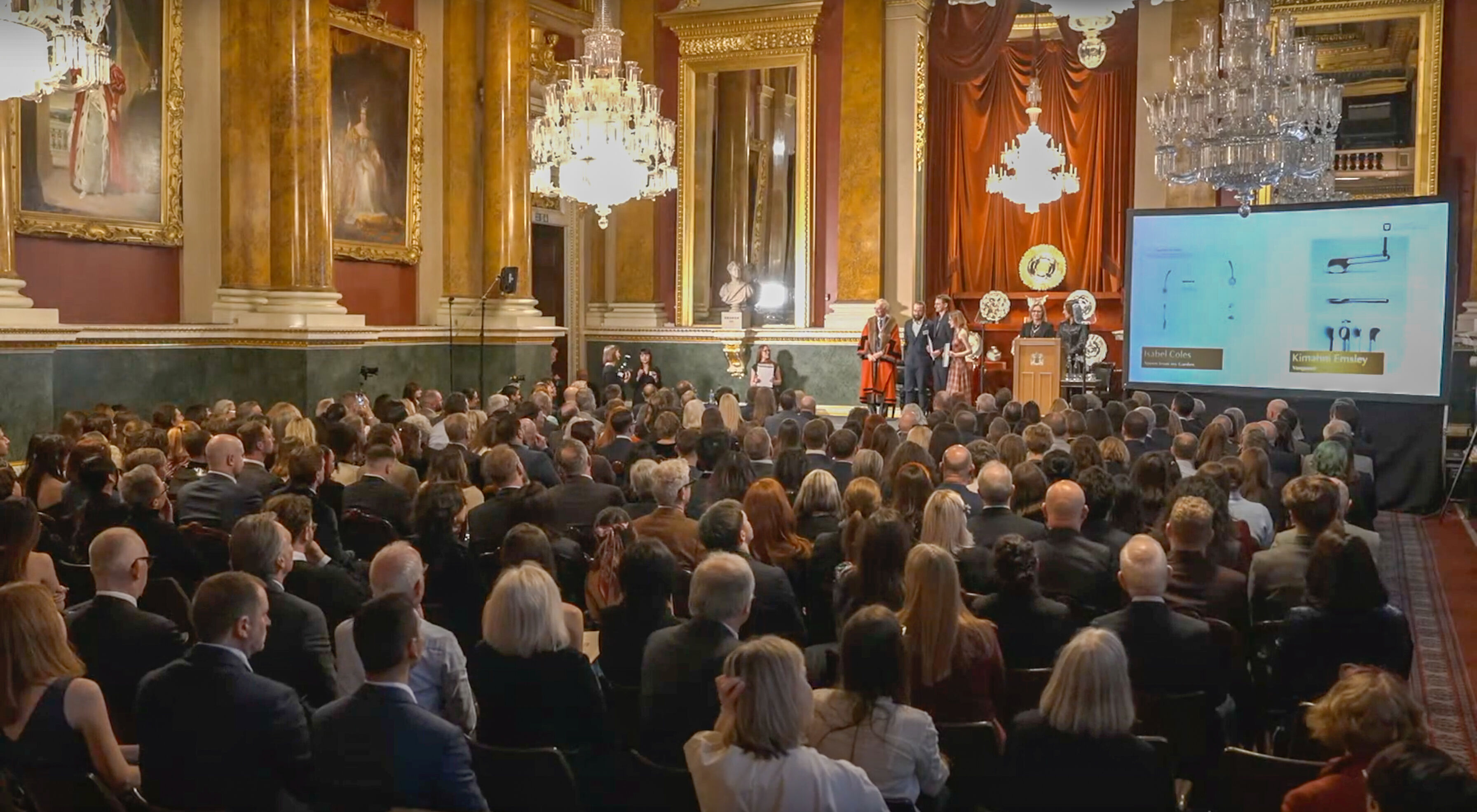
Students shine at 'Jewellery Oscars'
Students, graduates and artists in residence at the School of Jewellery picked up multiple accolades at the annual Craftsmanship and Design Awards, known as the ‘Jewellery Oscars'. Five students, four graduates and two artists in residence at the School of Jewellery excelled in these two categories to scoop Bronze, Silver and Gold awards.

Athena Swan Bronze Award
Our Jewellery, Fashion and Textiles courses have been awarded the Athena Swan Bronze Award for our commitment to Equality, Diversity and Inclusion (EDI).
Athena SWAN is a quality charter mark framework and accreditation scheme established and managed by the UK Equality Challenge Unit in 2005 that recognises and celebrates good practices in higher education and research institutions towards the advancement of gender equality: representation, progression and success.
Employability
Enhancing your employability skills
The course is designed to introduce and advance processes and techniques used within the Jewellery industry. Each module is designed to show how to utilise tools, techniques and processes to their fullest potential and allow you to develop an understanding in areas that interest you.
In addition to the traditional hand fabrication skills, you will learn about production and batch production techniques, hand engraving, gem-setting, micro setting, small scale silversmithing, CAD production and wax carving, amongst other techniques. We pride ourselves on the fact that you will learn most of this throughout practical classes, demonstrations and studio practice, and our many connections to the jewellery industry support us in this.
Many of our graduates are now prestigious makers and designers. Our students graduate and gain employment in companies such as Asprey’s, Bespoke Quarter, Vipa Designs, Weston Beamor, Centre Jewellery, Cooksongold, Royal Mint, Gerrards, Thomas Fattorini, Hockley Mint, Lucy Walker, and James Newman, amongst others. In addition to this some students choose to start their own businesses.
In recent years, our graduates have included Kevin Gray, Heather Coleman (Heather Coleman Jewellery), Andrew Cowley (Bespoke Quarter) and Jack Row (Jack Row). Our graduates also have the opportunity to progress onto the top-up degree course, BA Jewellery and Silversmithing – Design for Industry.
Placements
You will be encouraged to take up any opportunities which are available to you; the jewellery industry frequently contacts us when they are looking for employees or with offers of work experience. It is not uncommon for our students to be working in the industry part-time while studying with us, and we have placed students into companies as diverse as Weston-Beamor (casting) and Thomas Fattorini (medal-making,) as well as into smaller workshops doing repairs, commercial stone-setting and small-scale manufacture.
Our students are also in demand for retail work as their experience in handling jewellery and their knowledge of gemstones and other materials is helpful in the retail environment.
Our Graduates
Naomi Newton-Sherlock - Director, Weston Beamor
Naomi studied at Birmingham City University in the mid 2000s, having already graduated with First Class Honours in languages. Education, work experience and networking have been valuable investments for Naomi, from the practical bench experiences with jewellers Cellini and James Newman, to studying additional courses to gain further skills such as gemmology.
After winning prestigious competitions, and working with both luxury and high street jewellers, she applied for a design position at Domino. Evolving the bridal and diamond ring mounts and growing the business, her professional and creative aptitude soon had her promoted. In 2015, she became Director of the brand’s sister company Weston Beamor.
Nicole Iredale - Company founder, Nicole Iredale Designs
After graduation, Nicole started her own business, Nicole Iredale Designs, sharing a workshop as part of the Design Space scheme. In order to fund her business, she took a part time job at Kokkino. This proved invaluable, from the cash flow injection to the experience of assisting at trade and retail shows, giving her confidence to take her own jewellery to the British Craft Trade Fair (BCTF). The success from exhibiting at the BCTF resulted in a number of shops and galleries stocking her jewellery.
Joseph Jackson - CAD Designer, Shaun Leane
Joseph worked as Shaun Leane’s CAD designer in London for 18 months straight after University (2014) and learned a lot about the bespoke process, getting to work on multi million pound pieces. Joseph studied first on the Higher National Diploma course before being accepted on the DFI top-up year, giving him dedicated access to new technologies. Joseph is also exhibiting at this year’s Goldsmith Fair and has recently completed a commission for a £34,000 diamond bracelet.
Jack Row - Award winner
Following successful graduation in 2007 and winning a number of awards, Jack entered employment for one of Europe's leading jewellery manufacturing companies. Experimenting with the application of CAD technology, Jack became fascinated with its potential for the creation of innovative, exciting products. He returned to study the DFI course, combining his traditional skills with the innovative application of CAD and RP (Rapid-Prototyping) technologies. Graduating with a First Class Honours degree a year later, Jack won the coveted British Jewellers Association prize for his precious metal fountain pen design concept. Six months later, he was awarded a Gold Medal prize by the Worshipful Company of Goldsmiths, one of the established Livery companies of London, for his 'Architect' prototype fountain pen.
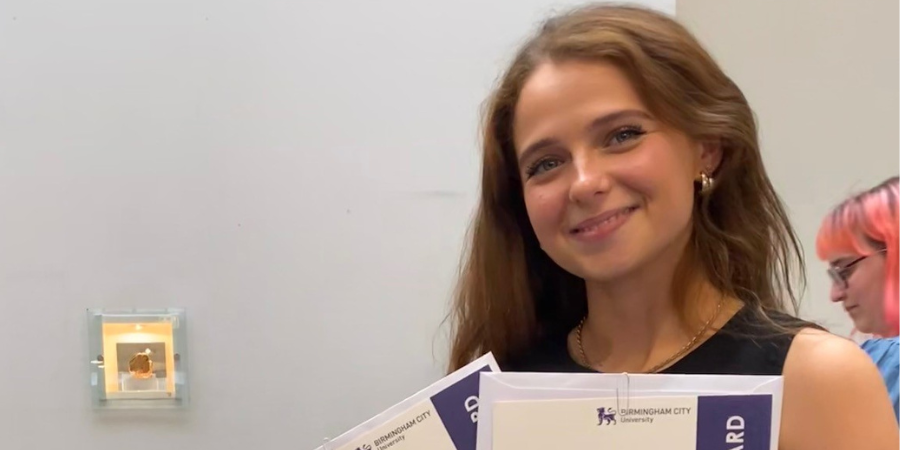
BCU jewellery graduate claims Bright New Gems 2025 accolade
Birmingham City University (BCU) graduate Ruby Lanigan has landed a prestigious Bright New Gems award thanks to her bold and architecturally inspired jewellery designs.
Facilities & Staff

Our Facilities
The School of Jewellery at Vittoria Street is inspirational and functional. A blend of traditional historic and cutting-edge contemporary, it is light, spacious and extremely well-resourced.
An extensive refurbishment programme integrated the Victorian Gothic building of 1863 with the adjacent 1912 extension and a site further down the road. The architects’ success in doing so resulted in awards from the Royal Institute of British Architects (RIBA) and the Civic Trust.
You’ll have access to industry standard equipment, studio workshops with specialist tools and a shared machine workshop with a wide range of powered equipment, a casting facility and an electroplating laboratory. The School’s main computer suite includes CAD design software and Adobe Creative Suite, and you’ll have access to a specialist library.
Our staff
Katy Tromans
Course Director, Lecturer
Katy Tromans creates highly detailed, organic, narrative Objet d’art with the aim to tell a story through her designs. Her pieces consist predominantly of sculptural, solid silver display stands which hold hidden, intricate pieces of jewellery. Katy aims to tell a story, show a memory and allow her customers to wear the best chapters of their...
More about KatyDauvit Alexander
Senior Lecturer
Dauvit has worked in the jewellery industry from the age of 14, training at the bench before going on to develop his own work as “The Justified Sinner”. Dauvit describes himself as a ‘metalsmith’ as his work now uses a variety of found metals – usually iron – treating it as precious metal, using the traditional skills of the fine jeweller but often...
More about DauvitSuzanne Ettrick
Lecturer in Higher National Diploma Jewellery and Silversmithing
Sue has over 26 years’ experience working in the jewellery industry ranging from retail to manufacturing; Sue runs her own business specializing in bespoke jewellery design, repairs, restoration and remodelling. A majority of the business is remodelling sentimental jewellery, reusing sentimental and precious materials and gemstones, giving them a...
More about Suzanne
